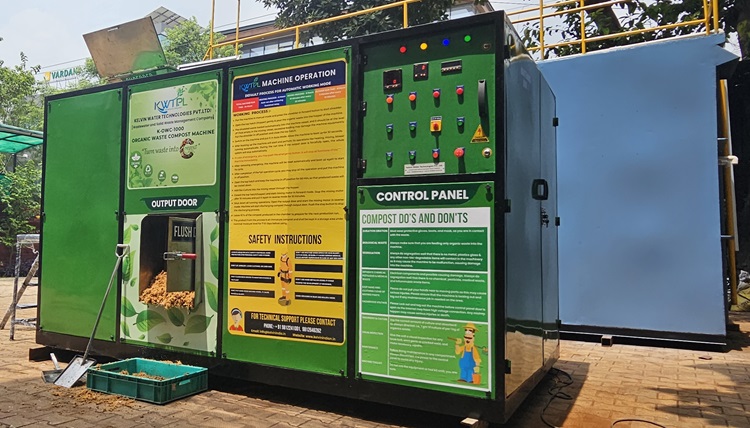OWC Composting Machine

What is an OWC Composting Machine?
An OWC composting machine is a state-of-the-art device designed to process organic waste into compost efficiently. These machines use biological decomposition processes accelerated by microbial activity to transform kitchen waste, garden waste, and other organic materials into high-quality compost. They are widely used in residential complexes, commercial establishments, and industrial setups.
Key Features of OWC Composting Machine
1. Compact Design: Most OWC machines are designed to fit into limited spaces, making them ideal for urban settings.
2. Fully Automated Operations: These machines feature automated processes, including shredding, mixing, and aerating, to ensure ease of operation.
3. High Efficiency: They can process large volumes of organic waste within a short period, producing compost in as little as 24 hours.
4. Odor Control: Advanced OWC machines are equipped with odour control systems to ensure a pleasant and hygienic environment.
5. Energy Efficient: Modern machines consume minimal energy, contributing to their cost-effectiveness.
6. Durable Construction: Built with robust materials like stainless steel, these machines are designed for long-term use.
How Does an OWC Composting Machine Work?
The OWC composting machine operates through a simple yet effective process:
1. Segregation of Waste: Organic waste is separated from non-biodegradable materials before being fed into the machine.
2. Shredding: The waste is shredded into smaller pieces to enhance microbial activity and accelerate decomposition.
3. Mixing: The shredded waste is mixed with additives like sawdust or microbial cultures to optimize the composting process.
4. Composting: The machine maintains ideal conditions for decomposition, including temperature, moisture, and aeration.
5. Final Product: Within 24-48 hours, the machine produces nutrient-rich compost ready for use in agriculture, gardening, or landscaping.
Benefits of Using OWC Composting Machine
1. Environmental Benefits
- Waste Reduction: Reducing methane emissions through diverts organic waste from landfills.
- Soil Enrichment: Produces compost that improves soil fertility and promotes sustainable agriculture.
2. Economic Benefits
- Cost Savings: Reduces waste disposal costs and eliminates the need for chemical fertilizers.
- Revenue Generation: Compost sold as an organic fertilizer, creating an additional revenue stream.
3. Operational Benefits
- Ease of Use: Fully automated systems simplify the composting process.
- Minimal Maintenance: These machines require minimal upkeep, ensuring hassle-free operation.
4. Social Benefits
- Community Engagement: Encourages communities to adopt sustainable waste management practices.
- Aesthetic Value: Helps maintain clean and odour-free surroundings.
Applications of OWC Composting Machine
OWC composting machines are versatile and employed across various sectors:
1. Residential Complexes: Manage organic waste generated by households efficiently.
2. Commercial Establishments: Ideal for hotels, restaurants, and supermarkets with high volumes of food waste.
3. Educational Institutions: Promote environmental awareness among students while managing cafeteria waste.
4. Industrial Units: Process organic waste generated during production activities.
5. Municipalities: Manage waste at a community level to reduce landfill dependency.
Choosing the Right OWC Composting Machine
When selecting an OWC composting machine, consider the following factors:
- Processing Capacity: Choose a machine that matches your waste generation volume.
- Space Availability: Ensure the machine fits within the designated area.
- Energy Consumption: Opt for energy-efficient models to minimize operational costs.
- User-Friendly Design: Look for machines with intuitive controls and easy maintenance.
- Customization Options: Some machines allow customization to meet specific requirements.
- After-Sales Support: Select manufacturers offering comprehensive support and maintenance services.
Maintenance Tips for OWC Composting Machine
1. Regular Cleaning: Keep the machine clean to prevent residue buildup and ensure smooth operations.
2. Periodic Inspection: Check for wear and tear to address issues promptly.
3. Filter Replacement: Replace filters as per the manufacturer’s recommendations to maintain odour control.
4. Monitor Additives: Use the recommended quantity of microbial cultures and additives.
5. Follow Guidelines: Adhere to the user manual for optimal performance and longevity.
Future of OWC Composting Machine
With growing awareness of sustainable waste management, the demand for OWC composting machines set to rise. Advancements in technology expected to enhance their efficiency, reduce costs, and expand their applications. Innovations like IoT integration and AI-driven monitoring systems are likely to revolutionize the composting process, making it more accessible and effective.
Conclusion
OWC composting machines are a game-changer in the field of organic waste management. They provide an eco-friendly, cost-effective, and efficient solution for converting waste into valuable compost. By adopting these machines, individuals and organizations can contribute to a cleaner environment, promote sustainable practices, and reap economic benefits. Investing in an OWC composting machine is not just a step towards better waste management but a commitment to a greener future.